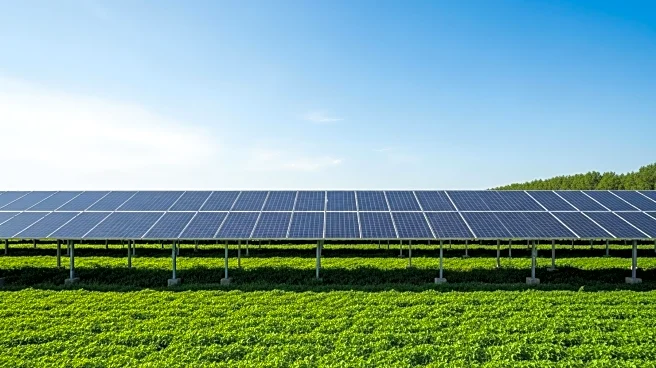What is the story about?
What's Happening?
A new agrivoltaic project in Virginia is set to demonstrate the potential of solar energy as a viable crop for farmers facing economic challenges such as tariffs, inflation, worker shortages, and climate impacts. The Piedmont Environmental Council's pilot project at Roundabout Meadows in Aldie, Virginia, has been recognized as 'Plan of the Year' in the 2025 North American Agrivoltaics Awards program. The project integrates solar panels with vegetable farming, aiming to provide a sustainable energy source while conserving soil moisture and reducing wildfire risks. The initiative includes energy storage systems to ensure continuous operation of farm equipment, even after sunset.
Why It's Important?
The agrivoltaic project represents a significant shift in agricultural practices, offering a sustainable solution to the economic pressures faced by U.S. farmers. By combining solar energy production with traditional farming, the project could help reduce reliance on biofuels, which have been criticized for higher carbon emissions compared to fossil fuels. This approach not only supports energy independence but also promotes environmental conservation and resilience against climate change. The success of this project could encourage wider adoption of agrivoltaics, potentially transforming the agricultural landscape and providing economic relief to farmers.
What's Next?
The project is expected to serve as a demonstration site, showcasing the feasibility of integrating solar panels with crop production. Researchers will collect data to optimize plantings and provide recommendations for future agrivoltaic projects. The initiative could lead to broader implementation across various settings, including urban environments and commercial spaces like wineries and breweries. As the project progresses, it may influence policy decisions and encourage investment in agrivoltaic technologies, further supporting the agricultural sector's transition to sustainable practices.
Beyond the Headlines
Agrivoltaics could play a crucial role in addressing food security and energy demands, particularly in regions facing environmental and economic challenges. The project highlights the potential for innovative agricultural practices to contribute to climate resilience and sustainable development. By fostering collaboration between farmers, researchers, and energy stakeholders, agrivoltaics could drive long-term shifts in land use and resource management, promoting a more equitable and sustainable food system.















